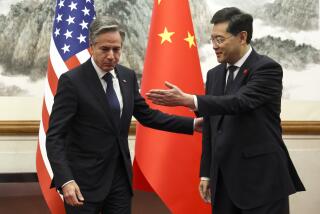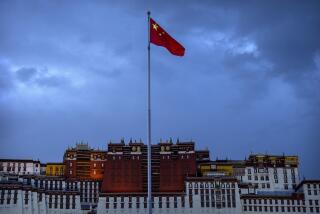China Trip Hints at Tibetan Thaw
- Share via
BEIJING — Two envoys of the exiled Dalai Lama have arrived in the Chinese capital for a visit that observers say might signal an opening in the diplomatic tussle over Tibet.
The envoys came to Beijing on what the Chinese government insisted Tuesday was an unofficial tour here and in Tibet to survey changes and see relatives.
But the two men, Lodi Gyari and Kelsang Gyaltsen, are close associates of the Dalai Lama, raising hopes that their trip heralds a thaw in the deep-freeze in relations between the exiled Nobel Peace Prize laureate and the Chinese government.
“His holiness the Dalai Lama is very pleased that the team is able to make such a visit,” the Tibetan government-in-exile in Dharamsala, India, said in a statement.
The trip is the latest in a string of recent events that some analysts see as a slight loosening on the part of the central government, which has held Tibet in a tight grip for half a century and claims it as an inalienable part of Chinese territory.
Earlier this year, the government released six political prisoners who had not yet served out their full sentences, including one Tibetan, Tanak Jigme Sangpo, who had spent 19 years behind bars.
In July, the Communist regime allowed a trip to China by the Dalai Lama’s brother, a frequent visitor to Beijing over the years who has acted as an unofficial conduit between the two sides since official contacts were cut off in 1993.
“When he came back, he reported that he felt very hopeful about the possibility of dialogue between China and the Dalai Lama’s government,” said Kate Saunders, a spokeswoman for the Tibet Information Network in London. “That was a significant thing for somebody like that to say.”
Officially, the Chinese government regards the Dalai Lama--revered as a god-king by his followers--as a separatist intent on breaking up “the motherland.” Beijing says it will not resume talks with the Buddhist spiritual leader unless he acknowledges that both Tibet and Taiwan, another diplomatic bone of contention, belong to China.
“On this basis, the central government can carry out talks with the Dalai Lama about his individual future,” Kong Quan, a spokesman for China’s Foreign Ministry, said Tuesday.
Communication between the two sides has continued through back channels, behind the wall of official mutual avoidance.
There has also been growing pressure from outside the country, and some say within it, for progress in the stalemate between Beijing and Dharamsala.
Much of the external pressure has come from the U.S. government. Chinese President Jiang Zemin is due to visit President Bush in Texas next month, for a one-day summit that Jiang is eager to see go smoothly. It may be his last major diplomatic trip as China’s No. 1 before a leadership reshuffle this fall.
“We do see the trip of Lodi Gyari to Beijing and then to Lhasa [the Tibetan capital] as a positive development, and we would hope that it would lead to progress on dialogue,” said State Department spokesman Richard Boucher.
The internal pressure springs from a debate on policy toward Tibet within the Chinese government, between those who favor a tougher line and those who advocate softer methods to keep Tibet bound to China. One of those methods is massive economic aid, which Beijing continues to pour into the region to develop roads, schools and hospitals.
The two envoys who arrived in Beijing on Monday are veteran critics of China’s rule over Tibet, which makes their visit all the more surprising.
Gyari, who is based for the most part in Washington, is affiliated with the International Campaign for Tibet, an organization in the U.S. capital that has not been shy in lambasting the policies of the Chinese government.
“The visit of Lodi Gyari is a very different ballgame” from past visits by the Dalai Lama’s brother, Saunders said. “He’s very much an influential power broker of the exile government and also very close to the Dalai Lama. He’s been based in Washington, so he’s had contacts with the State Department and Bush administration.
“The question remains what will be the follow-up,” Saunders said. “Is it just gesture politics, attempting to give America a concession before Jiang’s visit, or is it more substantial?”
Recently, China has increased access for foreign reporters to the former Himalayan kingdom. A group of such journalists is due to leave Beijing today on a tour of Tibet--the second such trip arranged by the government this year.
More to Read
Sign up for Essential California
The most important California stories and recommendations in your inbox every morning.
You may occasionally receive promotional content from the Los Angeles Times.














